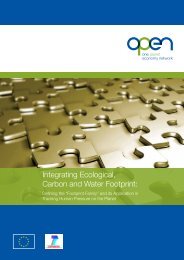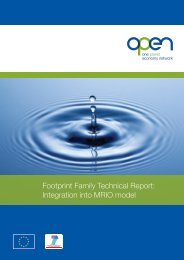OPEN: EU Scenario Storylines Report: - One Planet Economy Network
OPEN: EU Scenario Storylines Report: - One Planet Economy Network
OPEN: EU Scenario Storylines Report: - One Planet Economy Network
Create successful ePaper yourself
Turn your PDF publications into a flip-book with our unique Google optimized e-Paper software.
The Green <strong>Economy</strong> Coalition<br />
The Green <strong>Economy</strong> Coalition is another group with aims very similar to those of the <strong>One</strong><br />
<strong>Planet</strong> <strong>Economy</strong> <strong>Network</strong>. It is a coalition of organisations from environment,<br />
development, trade union, consumer and business sectors, North and South, which are<br />
committed to the common cause of accelerating a transition to a new green economy. It<br />
aims to provide a platform for debate, organise and share knowledge, identify priority<br />
issues and strategic opportunities, build consensus on them, and communicate policy<br />
messages to key audiences. Part 3 of the Coalition‘s ―core script‖ (preceded by Part 1 on<br />
a Shared Analysis and Part 2 on ―Glimpses of the Future‖ showcasing current initiatives<br />
that work and represent examples of tomorrow‘s world) will include a Transition<br />
Roadmap. This will suggest a ―roadmap‖ of economic policies, critical activities, and other<br />
enabling conditions that will accelerate progress towards GEC‘s vision for ―a resilient<br />
economy that provides a better quality of life for all within the ecological limits of one<br />
planet‖ (Green <strong>Economy</strong> Coalition 2011, 1).<br />
Related existing scenarios<br />
Over the last few decades scenarios have been used with increasing frequency to support<br />
the policy making process and to aid in planning for the future, especially in the context<br />
of environmental issues. In the early 1970s, Shell pioneered the use of scenario thinking<br />
in corporate strategy, helping decision-makers anticipate and prepare for possible future<br />
events and optimising the ability to turn challenges into chances. Since then, scenario<br />
thinking has been taken up as a useful tool for many other strategic decision making<br />
contexts – for example, regarding the environment. Some of the most widely known<br />
environmental scenarios include exploratory (or forecasting) scenarios on climate and<br />
greenhouse gas emissions (IPCC), ecosystems (MEA), and land use change (EEA<br />
PRELUDE). In recent years, an increasing number of scenarios have traded the<br />
exploratory approach for a backcasting approach in order to focus options for meeting<br />
the challenge of transitioning to social, economic, and environmental sustainability. The<br />
following is a selection of scenarios most relevant to the <strong>OPEN</strong>:<strong>EU</strong> scenarios.<br />
WBCSD Vision 2050: The new agenda for business<br />
In 2009, the World Business Council for Sustainable Development (WBCSD) engaged 29<br />
of its member companies in developing a vision of a world ―on-track toward<br />
sustainability‖ by 2050 and outlined a pathway for achieving this. The objective of the<br />
Vision 2050 project was to challenge companies to rethink and envision opportunities<br />
that put sustainability at the centre and also to invite governments to consider which<br />
policies are needed to organise society and give market incentives to move toward<br />
sustainability. The leading questions that drove the exercise were:<br />
What does a sustainable world look like? How can we realise it? What are the roles<br />
businesses can play in ensuring more rapid progress toward what world?<br />
The result was a pathway that features many fundamental changes that are not only<br />
necessary, but also feasible and offer many business opportunities. The ―new agenda for<br />
business leaders‖ is based on a shift from thinking of climate change and resource<br />
constraints as environmental problems to understanding them as economic ones related<br />
Page 49 of 57





